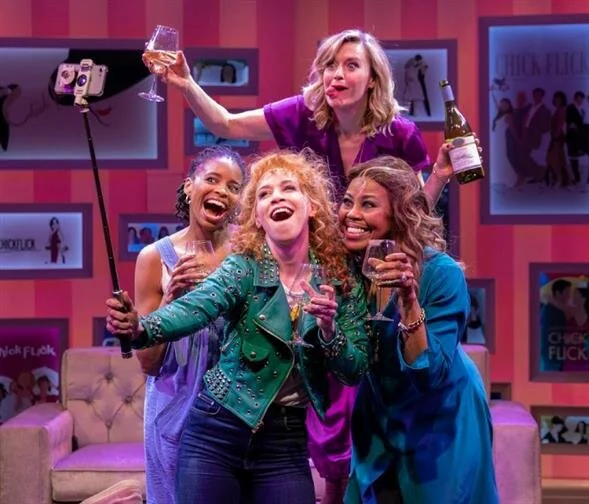Singing the Praises of Chick Flicks on Stage
The cast of CHick Flick the Musical
Originally published on TDF Stages
View this story online
Fans of so-called chick flicks — cinematic stories centering on romance, family and female friendships — often defend their penchant for these films by dismissing them as "guilty pleasures." But according to Suzy Conn, who wrote the book and songs for Chick Flick the Musical at the Westside Theatre, there's no reason to be embarrassed about loving movies that provide so much happiness, hope and, yes, even empowerment to women.
Conn has a herstory of crafting female-centric tuners, including Suffra-Jets, about the turbulent lives of stewardesses during the '60s feminist movement, and The Mercer Girls, about the young unmarried women recruited to help populate the Pacific Northwest in the 1860s. While Chick Flick is inspired by more lighthearted fare, she takes the material just as seriously.
"Just because chick flicks have female protagonists and female topics and themes, they're seen as less worthy," she says. "I think that speaks to a deep bias — that something shared by women and about women is, by definition, not as good. I want to embrace all the things that women like, and celebrate that as powerful."
In Chick Flick, four gal pals gather for cocktails and a movie. But instead of just watching “Pride and Prejudice” as planned, they end up bickering and bonding over the challenges they face trying to find fulfillment. There's Karen (Sharon Catherine Brown), a stressed-out working mother of a surly teenage daughter; Dawn (Megan Sikora), an actress of a certain age struggling to land roles; Meg (Carla Duren), a successful baker with a philandering boyfriend and Shelia (Lindsay Nicole Chambers) who can't separate romance from reality.
Conn parodies and deconstructs the hallmarks of the genre throughout. In one song, the lovesick Sheila urges her friends to "Eat Your Feelings." A makeover is executed to the '80s glam-rock-style "Iced Seduction." And Conn upends one of the biggest tropes of all: the inevitable competition between two female characters. Former college roommates Karen and Dawn secretly envy each other, but their conflict is motivated by their own self-doubt. By exploring their insecurities about financial and professional success — issues usually reserved for male characters — Conn puts a feminist spin on the story. Ultimately, they end up resolving their differences with a heartfelt conversation. That's a far cry from clichéd rom-com catfights over a man.
"For a long time, women didn't have a choice about how to spend their lives," Conn notes. But even though modern-day women are allowed to go in any direction they desire, the you-can-have-it-all ethos weighs heavily on our gender. "Because we're now allowed to make choices, we also have moments when we realize we haven't done everything we wanted to, or we feel like we made a wrong choice," she says. "The midlife crisis for women feels very potent."
A former marketer at Procter & Gamble who tried her hand at songwriting in Nashville before seguing to musical theatre, Conn has been developing Chick Flick for the past five years. In 2016, it was poised to open in Chicago, but the funding fell through. The bumpy road to Off-Broadway helped inform the show and its perseverant protagonists, who are charming and accomplished but also messy and flawed.
"I want to embrace flaws more," Conn says. "We're all flawed. Why should women be held to a higher standard of behavior than men? It's unfortunate but it's very true that we often are."Conn hopes her fellow chick flick aficionados will get the same buzz from her musical that they do from watching movies such as “When Harry Met Sally, “ “Julie & Julia” or “Steel Magnolias,” three favorites quoted in the opening number, "The Chick Flick Drinking Game." As she puts it: "Water and air and female friendship are what get us through life."

